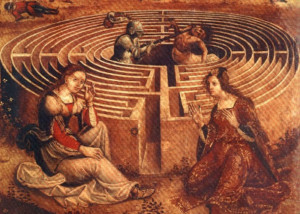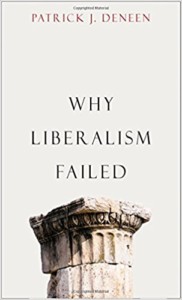A few weeks ago, I compared Jordan Peterson with the medieval theologian Peter Lombard. I didn’t go into great detail on my own intuition in this matter. After some ill feelings about the analogy, I’ve come to reaffirm it in my own mind.

The quest for Truth does not proceed linearly, and it brings personal risk. One might be devoured by a half-man, half-beast creature lurking in the region of the Id.
Neither Peterson nor the Lombard is a systematic thinker, though Lombard made more of an attempt in this direction. Both frequently admit that they don’t know everything and tend to qualify their responses to pressing questions with acknowledgments of inadequacy. Peterson is not always completely faithful to his own principles, as I plan to demonstrate in more detail. But I find this less a personal failing and more of an indication of the pervasive temper of our present situation.
Both have wide-ranging interests. Peterson’s sallying forth into foreign academic territory does more than raise the hackles of the local sovereigns. He ends up raising even more questions than he attempts to answer. It’s not clear to me that he’s always aware of this. But like Lombard, the net effect of his work is to make clearer the incoherences of our present culture.
This tendency on the part of both thinkers opens up a field for others who may wish to work on bringing consistency to their wide-ranging speculations. Lombard’s Sentences became the starting point for high medieval theology. Now it happens–and this is one of those odd coincidences of history–that the works of Aristotle were being reintroduced to Western thinkers around the end of Lombard’s life. This meant a whole new range of techniques for reconciling and harmonizing what appeared to Lombard and his contemporaries as inconsistencies in the Western theological tradition. In my opinion, St. Thomas Aquinas retained personal modesty in imitation of Peter Lombard. I understand the Summa to be a collection of Aquinas’s best answers to disputed questions. I don’t believe Thomas intended to have the final word.
But he was so outstanding at this form of analysis and harmonization that his qualified answers became settled truth and set theology on a dangerous course, toward hyper-certainty, a hyper-certainty I associate with the unequivocal language of the nominalists, especially Ockham. This, in turn, laid the groundwork for the hyperrationalism that has brought us to a crisis of symbolism.
One of Jordan Peterson’s great merits is precisely his willingness (even with some inconsistency) to recognize large grey areas in life and to encourage individuals to work on their own answers. His robust defense of free speech is premised on an optimistic assessment of human intelligence, including the intelligence of what Alasdair MacIntyre would call “plain persons” (as distinct from professional thinkers, especially philosophers). He and MacIntyre share this confidence in the rational potential of plain persons. But my larger point here is that Peterson is viewed as a threat to liberalism precisely because his interest in myth and his confidence in plain persons loosens the mortar between the bricks of liberal modernity’s imposing edifice.

I agree with Patrick Deneen that liberal modernity needs rethinking.
I suspect that traditional Christianity offers many resources for clarifying the inconsistencies of Peterson’s thought. But it also might require a more radical change of perspective than what Peterson has so far accomplished. Peterson is still, in my opinion, trying to fix liberalism from inside. While I share his and MacIntyre’s optimism, the direction that Peterson’s best thought is trending ought to lead to an “epistemological crisis,” perhaps a crisis similar to the one undergone by MacIntyre himself as he wrestled over the implications of Stalinism for Marxist orthodoxy. For MacIntyre, this crisis contributed to him become a Catholic in the early 1980’s. We will wait and see where this leads Peterson and his followers.